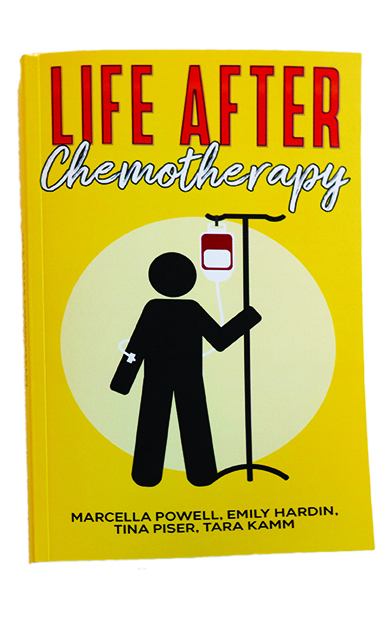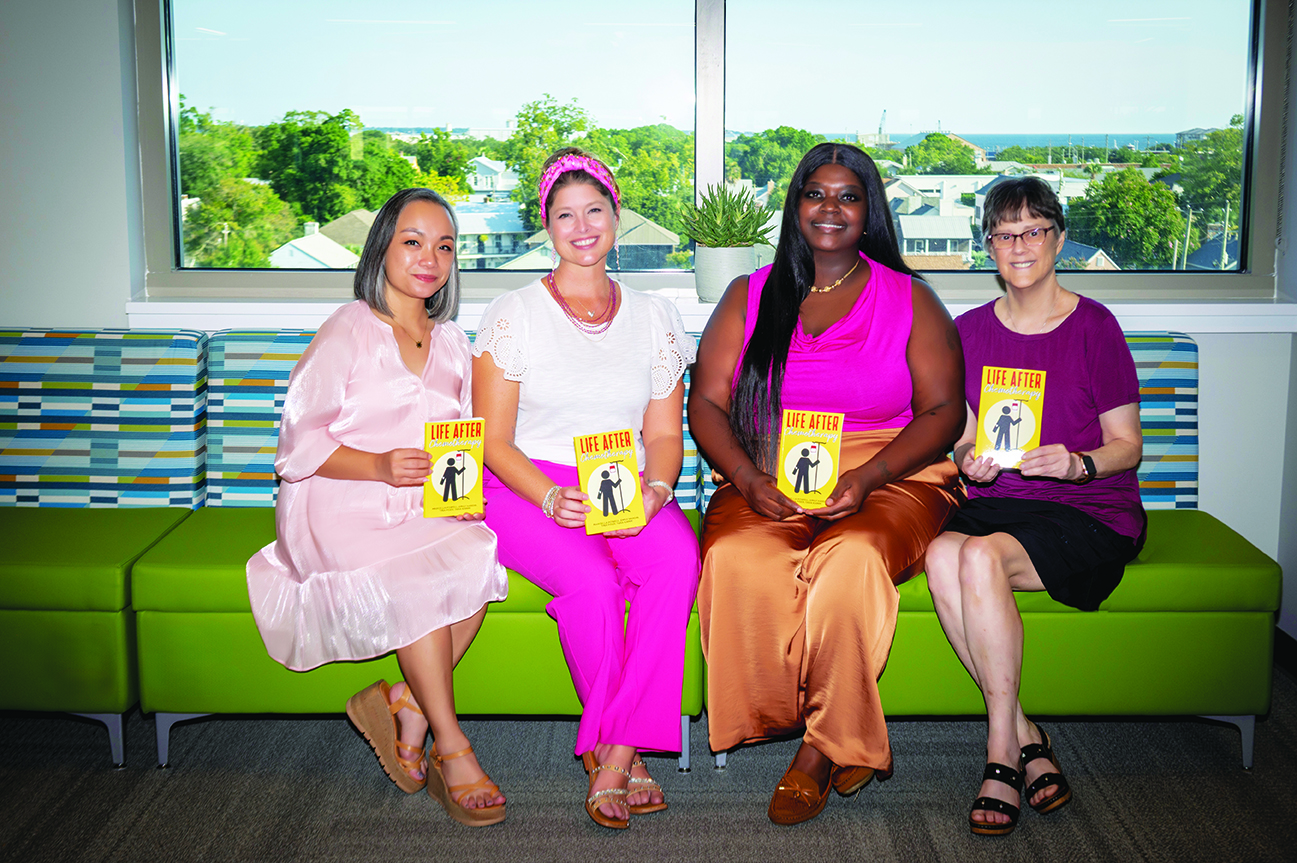From strangers to sisters.
An entwined passion to highlight life after breast cancer treatment.
By Justine Williams Roper Photos by Kate Treick Photography

Available at Amazon, Barnes & Noble, Walmart, ThriftBooks.com and most major book retailers.
Each year in October, celebrations of those who have overcome the harrowing journey of breast cancer and memories of those who succumbed to the disease surround us. From walks to fundraisers, we share stories and shed tears. Many might imagine that the stories of women who beat cancer are finished once they are able to ring the bell and hear the sound of the victory on the oncology floor. Yet, this is only the beginning to another chapter. Four local women recently turned this part of the story into a book to help others.
“Life After Chemotherapy” started as just an idea from co-author Marcella Powell, whose own breast cancer journey revealed a need for more than just a victory lap. She believed that continued mental, physical, and spiritual support is what her book should advocate for and shine a light on.
“When I was going through it, I did have a few people I could talk to,” she recalled, “but they weren’t as transparent as I had wished. I wanted to put something out there that’s full transparency: not only the highs, but the lows; not only the good, but the bad.”
SISTER SURVIVORS
Powell’s vision quickly turned into a reality when she reconnected with other amazing women she had met along her journey.
“More than one story needed to be told,” she explained. “I knew women who had gone through the journey, and I felt it was important to have more than one perspective.”
All diagnosed at a younger age than the average breast cancer diagnosis, the four co-authors, Powell, Tara Kamm, Tina Piser and Emily Hardin, met during their first session in a group led by oncology assistant Nikki Kelly.
“From there, we just clicked,” Powell said. “We gravitated to each other, and we have been friends since.”
For Kamm, being strong and vulnerable is a delicate balance she thought many would appreciate, and her deep connection to that challenging dichotomy attracted her to the project.
“I believe our stories are so powerful. When you share your truth, you give someone else permission to breathe, to feel less alone, to believe they can get through it too,” she said.
Piser agrees. Yet what she recalls is the silence in the group being as loud as the words they would share. Her chapters highlight that this quiet resilience may not make headlines, but can assist in the healing of many survivors, as this part is difficult and requires more than words can say.
What Hardin brings is a candid perspective on physical changes that linger well after chemotherapy and other treatments end. She laughs about rediscovering some of her favorite things like coffee, yet the reality of joint pains and brain fog live on.
“It’s not just about surviving,” she says. “It’s about finding ways to live well, even with the changes.”

LESS VISIBLE BATTLES
As the conversation turned to practical strategies for managing ongoing symptoms and reclaiming a sense of identity, the women spoke candidly about building new routines.
“I hoped that people reading my story, and all of our stories, would find not only hope but also helpful tips on how to deal with side effects, emotions and everything that comes after,” Piser said.
Chemo-brain (aka brain fog), fatigue and memory loss were top post-treatment symptoms that were all familiar to the co-authors. Some found relief in gentle movement like yoga or walking, others in crossword puzzles or journaling their daily progress or simply setting aside time for mental and physical rest.
“The first step to reclaiming myself,” Powell shared, “was admitting that I couldn’t go back to who I was before. I had to embrace who I was becoming.”
By focusing on small, intentional practices, the authors showed that recovery is not about erasing scars but about weaving them into a stronger, more authentic self.
SUPPORT & WHAT IT
SHOULD LOOK LIKE
When asked how close friends and loved ones should be there for someone with a breast cancer diagnosis, the co-authors collectively agree that presence matters more than perfection—listening versus running to try to ‘fix” the diagnosis. You do not need perfect words; your presence is the first step. Also, using the gift of patience is pivotal in reminding loved ones that recovery is uneven, and a survivor’s needs may shift from day to day.
With a diagnosis like breast cancer, no one’s body will present the same in recovery. In many cases, guidance surrounding the experience of recovery is often left to the former patient to discover on her own, leaving a gap that needs to be filled.
“I recommend doctors having the same thing they assign us in the beginning: a nurse navigator. From diagnosis to surgery to chemo, we’re guided. But after chemotherapy, there should still be a nurse navigator helping us through that phase, too,” Powell said.
More support is needed, and the co-authors agree that support groups and building trusting relationships were key to their recovery success. Community is an undervalued tool that can remove isolation and be a bridge to healing.
A CONVERSATION FOR ALL
The journey of rediscovery post-cancer treatment should be something everyone understands.
“So many people get stuck in the negative mindset of the diagnosis, not knowing how to free themselves from that. Sharing our personal stories is powerful because it shows hope and inspiration,” Kamm said.
This book’s power extends beyond the bookshelf and is a guide that will help breast cancer survivors and loved ones thrive.
“I think it’s helpful to have something that says: Look, you can go through something really difficult and still come out with your spirit intact, with deep appreciation, and with relationships that are stronger than you imagined,” Hardin said.
Through four unique voices, one banner of victory stands. No matter how many bad days you have, no matter how many times you give up in your head, you keep putting your best foot forward.
MORE RESOURCES
Power Over Pink Podcast with host Tara KammAvailable on YouTube with video episodes and on all major podcast streaming platforms. Also on Facebook, Instagram and TikTok under the same name.
YSC Northwest Florida Face 2 Face Support GroupHosted by Marcella Powell, Tara Kamm and survivor Heather Presson. Affiliated with the Young Survivor Coalition for women diagnosed with breast cancer under the age of 41.
Pensacola Boobie Boutique by Emily HardinBy appointment only. Wig and bra fittings available by emailing pensacolaboobieboutique@gmail.com or calling 850-455-4770. Bras and wigs are available for donation to those in need.







